|
Research out of Penn State Center for Sport Concussion shows potential benefit of targeted head cooling for athletic concussion 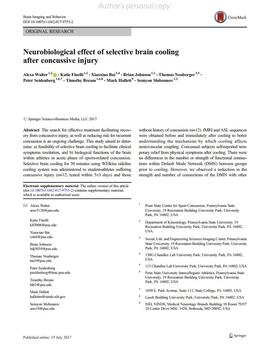 “Currently there are no clinically validated tools or procedures to treat concussive injury,” said Semyon Slobounov, professor of kinesiology and an author of the studies. “The results of these studies provide some preliminary evidence that concussive brains may benefit from science-based treatment, such as brain cooling and the use of a new supplement.” The study used Welkins' FDA-cleared cooling system to explore the biological effects of lowering temperature on brain injuries in athletes. Athletes in the acute phase of injury, or within seven to 10 days of diagnosis, underwent functional MRI and arterial spin labeling testing – an MRI technique for measuring blood flow in tissues – before and after using the cooling device. After cooling, concussed subjects reported temporary relief of concussion symptoms such as dizziness, nausea, concentration and memory difficulties. Researchers also noted increases in cerebral blood flow, or blood flow to the brain, after cooling was applied. “This study suggests that compromised brain functioning in the acute phase of injury could be temporarily restored with brain cooling,” Slobounov said. Published study suggests brief and selective head cooling with WElkins SCS can enhance aerobic performance 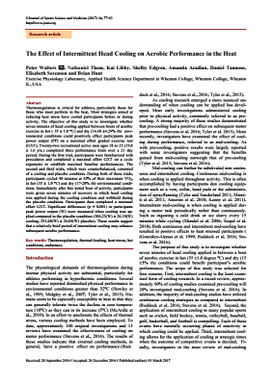 Researchers at Wheaton College announced the publication of their athletic cooling study in the Journal of Sports Science and Medicine. Key findings included a considerable and statistically significant improvement in athlete performance (power output and time to volitional exhaustion) when head-neck cooling was used over a control condition. The athletic study compared WElkins head-neck cooling against a placebo (counter-balanced) in a short recovery window between bouts of aerobic exercise in hot (35C) conditions: athletes began with a 40-minute cycle at 65% maximal VO2, briefly recovered with active cooling or placebo, then concluded with a maximal effort graded exercise test (GXT). When athletes received active cooling during the brief recovery window, their performance on the subsequent GXT exhibited a considerable increase in peak aerobic power output and extended the time to volitional exhaustion by more than 30 seconds. See below for the Abstract and a link to the full article. WElkins is honored to be included in this year's NASA Spinoff magazine. The magazine, which is published each year by NASA's Technology Transfer Program, features a terrific 4-page spread dedicated to WElkins and the illustrious career of its founder, Bill Elkins. Big thanks to NASA and the team at Spinoff for including us! Link to Spinoff article: Cooling Garments Find New Medical, Athletic, and Industrial Uses (NASA)
New interview includes insights from cardiac chief and patient on pilot study of WElkins' cooling systems in the NorthShore OR and ICU
Former Illini football player Kevin Jackson, a senior research scientist at the Beckman Institute, discusses his research and development of more effective treatments for head and neck injuries We heartily recommend reading the new piece on Kevin Jackson published by the Beckman Institute last week. A former star running back at the University of Illinois, Jackson earned his Ph.D. in 2003 and helped adapt WElkins military cooling technology for possible use tackling the multi-faceted challenge of athletic head and neck injury. Jackson continues to conduct groundbreaking research in coordination with the Carle Foundation Hospital, Beckman Institute, and U of I Division of Intercollegiate Athletics -- we wish him continued success!
Link to full article: Jackson Looks at Athletic Injuries (Beckman Institute) Penn State to utilize WElkins' brain cooling technology to explore "revolutionary step" in the treatment and prevention of sports-related concussions WElkins, LLC is excited to share Penn State's announcement today of a groundbreaking new research program into the effects of brain cooling on sports-related concussion. The Principal Investigator, Semyon Slobounov -- Professor of Kinesiology and Director of the Penn State Center for Sport Concussion Research and Service -- studies sports-related traumatic brain injuries using advanced virtual reality and brain imaging tools. Now, with support from WElkins and Spartan Medical, he is determined to learn what more can be done about a problem that continues to arise in athletes of all ages, despite advanced testing and updated regulations and protocols.
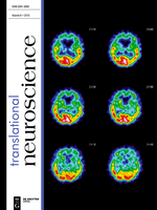 New article summarizes myriad anatomical, physiological, preclinical, and clinical data concerning WElkins' head-neck cooling technology as a potential treatment for mTBIs, particularly in the context of contact sports. A new report, published last week in Translational Neuroscience, provides an excellent review of the underlying science and research behind selective brain cooling and its potential for concussion injury in contact sports. WElkins' Cooling Headliner is featured in the piece, as are data from past studies using the device. The Company did not sponsor the effort, but is grateful for the thoughtful analysis by a talented, multidisciplinary team from the University of Illinois at Urbana-Champaign (Departments of Molecular and Integrative Physiology, Mechanical Science and Engineering, and Electrical and Computer Engineering), Carle Foundation Hospital (Neurosurgery, Internal Medicine and Sports Medicine), Beckman Institute (Thermal Neuroscience Laboratory), and Mayo Clinic (Laboratory Medicine and Pathology). Keep reading below for the abstract and a link to the full article.  We are excited to share some initial results from a recently completed athletic cooling study using WElkins’ Sideline Cooling System. Researchers at Wheaton College discovered considerable and statistically significant improvement in athlete performance (power output and time to volitional exhaustion) when head-neck cooling was used over a control condition. A full manuscript has been submitted for publication, but you can read below for a “sneak peek” at the findings: Quantitative Analysis Illustrates Enormity of the Diminutive Phrase
In three short words, the phrase “time is brain” succinctly captures the rapid progression of brain damage during stroke and reinforces the importance of rapid medical intervention. Its simplicity lends itself naturally to ubiquity (reflecting its genesis from Benjamin Franklin’s still-popular aphorism, “time is money”), and the phrase remains a popular theme in messaging about stroke and other hypoxic-ischemic injuries, including traumatic brain injury and cardiac arrest. 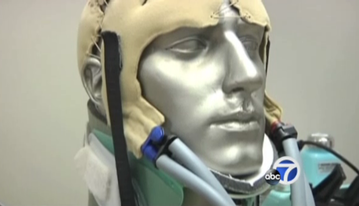 WElkins’ cooling technology was featured on ABC-7 News following last night’s NFL game between the Oakland Raiders and Denver Broncos. Read the story. |

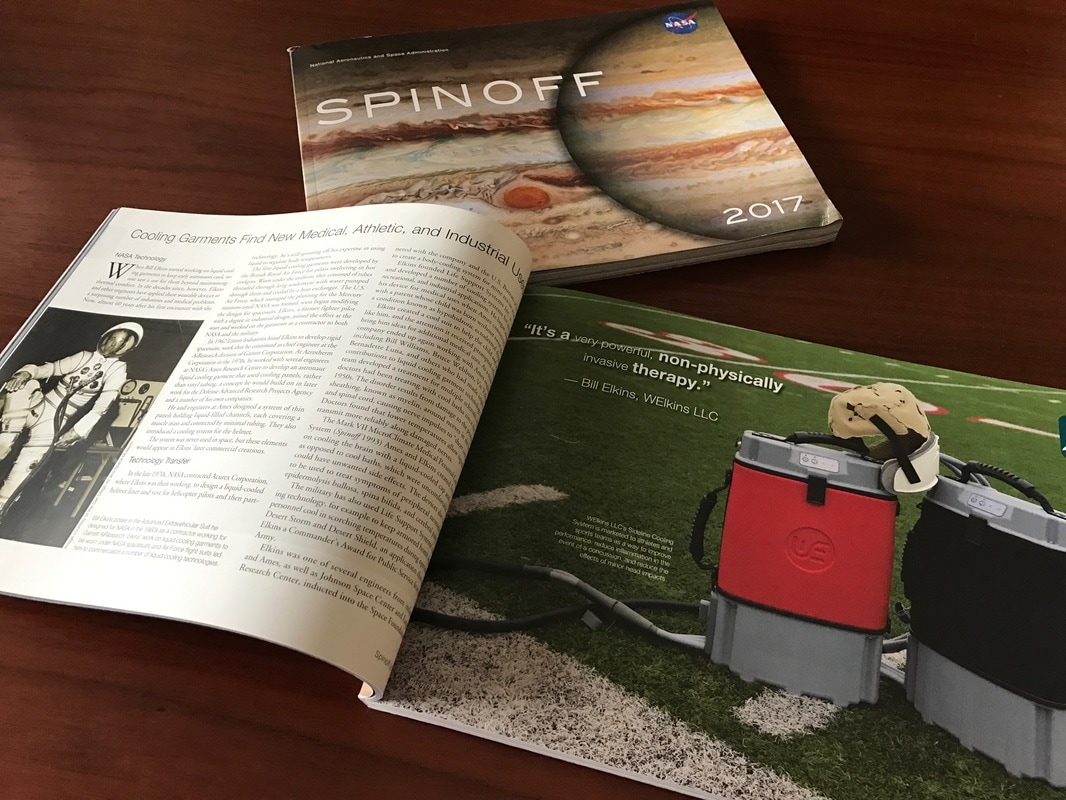
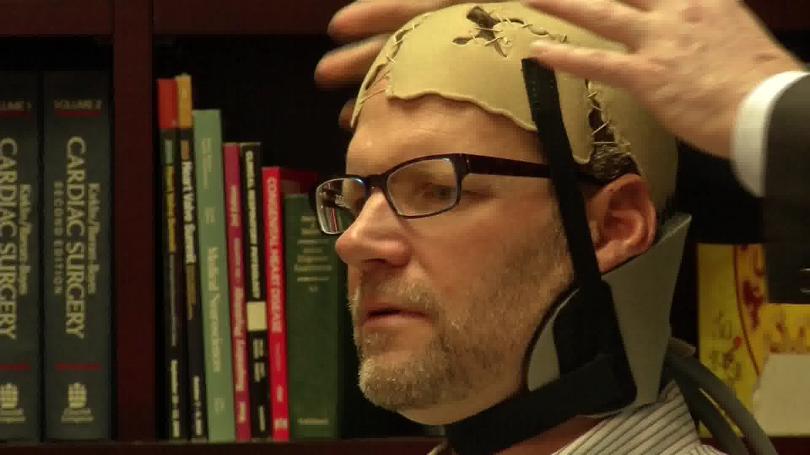
 RSS Feed
RSS Feed
